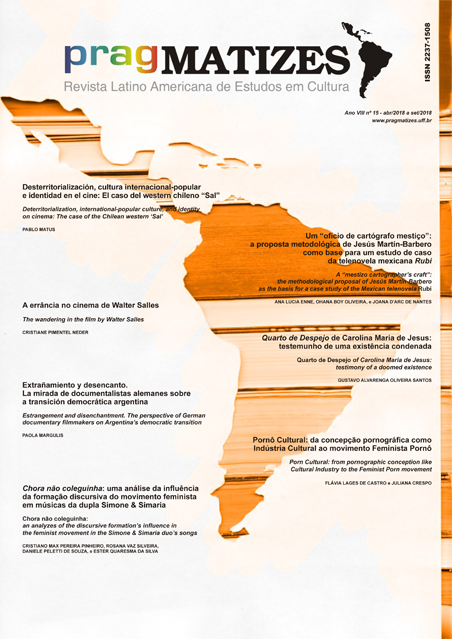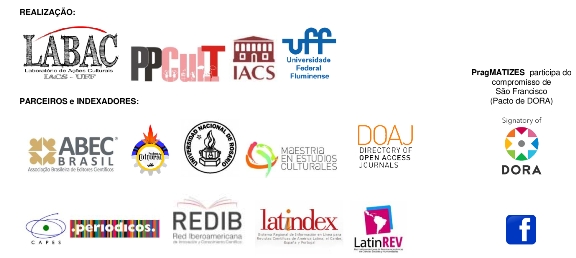Estrangement and disenchantment.The perspective of German documentary filmmakers on Argentina’s democratic transition
DOI:
https://doi.org/10.22409/pragmatizes.v0i15.10523Abstract
The present article examines the perspective of two German filmmakers on the process of democratic transition in Argentina through an analysis of two documentaries: De l’Argentine / De la Argentina/ For example Argentina (Werner Schroeter, 1983-1985) and Kreuzzuggegen die Subversion / Panteónmilitar (Wolfgang Landgraeber, 1991). These films denounce different aspects of Argentina’s traumatic past, focusing on the difficulties that, during the 1980s and beginning of the 1990s, the Argentinean State was encountering to condemn crimes against humanity committed during the last military dictatorship. The approach to these documentaries will have as its main objective a study of the cinematographic take on the “disenchantment” that deepened among wide sectors of the society after the statutes of limitation on military trials.
Key Words: .Cinema; Documentary; Argentina; Dictatorship, Transition to democracyDownloads
References
ACUÑA, Carlos; SMULOVITZ, Catalina. Militares en la transición argentina: del gobierno a la subordinación constitucional. En VVAA. Juicio, castigos y memorias. Derechos humanos y justicia en la política argentina, Buenos Aires: Nueva Visión, 1995. P. 21-99.
BORGES, Jorge Luis. El simulacro. En Obras completas. Buenos Aires: Emecé, 1974. P. 789
CAMPO, Javier. Revolución y democracia. El cine documental argentino del exilio (1976-1984). Buenos Aires: Ciccus, 2017.
CANELO, Paula. La descomposición del poder militar en la Argentina. Las Fuerzas Armadas durante las presidencias de Galtieri, Bignone y Alfonsín (1981-1987). En PUCCIARELLI, Alfredo (Coord.) Los años de Alfonsín: ¿El poder de la democracia o la democracia del poder? Buenos Aires: Siglo Veintiuno Editores, 2006. P. 65-114.
CRENZEL, Emilio. La historia política del Nunca Más: La memoria de las desapariciones en la Argentina. Buenos Aires: Siglo Veintiuno, 2008.
EGEA, Juan. El desencanto: La mirada del padre y las lecturas de la transición. Symposium: A Quarterly Journal in Modern Literatures, vol. 58, Issue 2, 2004. P. 79-92.
GARGARELLA, Roberto. Democracia y derechos en los años de Raúl Alfonsín. En GARGARELLA, Roberto; MURILLO, María Victoria;
PECHENY, Mario (Comps.). Discutir Alfonsín. Buenos Aires: Siglo Veintiuno, 2010. P. 23-40.
MARKARIAN, Vania. De la lógica revolucionaria a las razones humanitarias: la izquierda uruguaya en el exilio y las redes transnacionales de derechos humanos (1972-1976). Cuadernos del Claeh, n° 89, año 27, 2004. P. 85-108.
MASSUH, Gabriela y GUARINI, Carmen. Medios del Norte. Imágenes del sur. Primer encuentro argentino-alemán sobre producción, distribución, coproducción y fomento del cine documental. Buenos Aires: Goethe Institut Buenos Aires, 1990.
METZ, Christian. La gran sintagmática del film narrativo. En VVAA. Análisis estructural del relato. Buenos Aires: Tiempo Contemporáneo, 1974. P. 147-153.
NUN, José. La teoría política y la transición democrática. En NUN, José; PORTANTIERO, Juan Carlos (Eds.). Ensayos sobre la transición democrática en la Argentina. Buenos Aires: Punto Sur, 1987. P. 15-56.
PORTANTIERO, Juan Carlos. La transición entre la confrontación y el acuerdo. En NUN, José; PORTANTIERO, Juan Carlos (Eds.). Ensayos sobre la transición democrática en la Argentina. Buenos Aires: Punto Sur, 1987. P. 257-293.
PUCCIARELLI, Alfredo. La República no tiene Ejército. El poder gubernamental y la movilización popular durante el levantamiento militar de Semana Santa. En PUCCIARELLI, Alfredo (Coord.) Los años de Alfonsín: ¿El poder de la democracia o la democracia del poder? Buenos Aires: Siglo Veintiuno Editores, 2006. P.115-151.
SCHWARZBÖCK, Silvia. Los espantos. Estética y postdictadura. Buenos Aires: Cuarenta Ríos, 2016.
Downloads
Published
How to Cite
Issue
Section
License
By forwarding an original to PragMATIZES, the authors agree that the copyright related to it is transferred to the Publishing. Articles and other writings are made available in PDF format from their publication, and they can be downloaded to institutional repositories and personal pages, provided that with their proper bibliographic indication.



